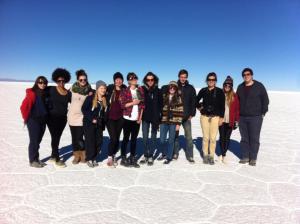Blog Archives
Dina’s ChildFund Project Reflections
As we approach the end of our three months volunteering here in Bolivia, it’s time to reflect on the impact our work has had on the communities with whom we’ve been working. Has our presence in La Paz made a difference in the lives of the locals here and contributed to the country’s development? As volunteers under the International Citizen Service scheme, we hope to develop ourselves as “global citizens” whilst making a positive contribution to various disadvantaged communities in developing nations around the world. The bigger aim is to work towards achieving the UN Millennium Development Goals by their 2015 deadline.
As 21 volunteers here in La Paz, our work is incredibly diverse. From teaching mothers about sexual health and offering discounted smear testing to building a greenhouse in the city of El Alto and educating the local communities about diet and nutrition; we are involved in many different areas. Our aim is to make our presence positively felt by a diversity of people in a variety of parts in need of being addressed. Prior to our arrival in La Paz, we had little idea about the specific details of our work making it all the more challenging once we got started. I think it’s safe to say that, as a group, we have put our all into our projects and have tried to take advantage of every opportunity to make a difference and a lasting, sustainable impact. Volunteers in El Alto, for instance, have sought to set up an on-going clothes recycling scheme to encourage volunteers and charity staff to donate any unwanted clothing to the communities here. Others, in various children centres and down in the district of Mallasa, have been working hard designing and painting murals and there’s even a garden being landscaped by a volunteer in one of our newest centres. It seems that, as we shortly prepare to leave La Paz, we will be able to say that we have made some difference here in Bolivia.
Personally, I have been working with adolescents and young people in a youth centre in Miraflores in association with the international charity ChildFund. My class is made up of a diversity of young people, mainly girls, between the ages of 12 and 17 who attend the centre when they’re not at school. I have been organising a range of interactive activities to teach the class about important themes and values, themes which are unlikely to be covered by their everyday curriculum at school but which are nonetheless vital to learn about.
I started out by running a class on self-esteem and confidence which was fortunately very well received by the students. It was my first chance to get an insight into the minds of the students and their thoughts on important issues such as prejudice and discrimination. Fortunately, contributions to the class discussion weren’t lacking and it was fantastic to receive feedback and opinions from so many of the students. I presented a video in which an office worker has a deformed face and is teased because of his appearance. After watching this, the class completed a worksheet which I had prepared and we went on to discuss their responses. The students were very receptive to the message of the video and even contributed their own personal stories on discrimination and bullying. I was very pleasantly surprised with their honesty and I think the activity helped to bring them a little closer as a class.
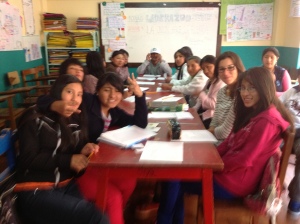
Dina Fahmy working with the students in her class
Next, I wanted to teach the class about the importance of a healthy diet and which foods offer the best nutrition. In order to make things a little more interactive and entertaining, we spent the first part preparing a fruit salad! This proved to be a great way to teach the students about the nutritional content of different fruits and vegetables. Ideally, the students will share what they’ve learnt with their friends and families and will use the nutrition worksheets I provided them with for future reference. It was a fantastic surprise when I returned to the centre the following week and found some of the girls snacking on apples instead of their usual lollipops and sweets before class.
We have also covered themes such as relationships, decision-making and leadership; with every class I have gotten closer with the students and learnt more about them and their interests. It is really promising to see that they’re an optimistic lot and have bold dreams and goals for the future. During my time working at the centres, I have tried to instil as much confidence in the students as possible, encouraging them to aim high. While the class is mixed, it is mainly girls and it is brilliant to see such strong, confident girls in action here in Bolivia, which statistically does not boast the best gender equality. Amongst the students are girls who want to become engineers, nurses, chefs, girls who want to go into higher education, girls who want to see the world – they are not discouraged from expressing their opinions and from dreaming big, and I really hope that they are able to make their dreams a reality.
In addition to my work in the centres, I have been working with the rest of the ChildFund volunteers in contributing to the development of a curriculum. Work on this curriculum began with previous cohorts of ICS volunteers and we arrived in La Paz in time to work on the final stages of its production. Education here in Bolivia lacks any established framework for teaching young people about sexual and reproductive health, or anything which could be seen as an equivalent to other national sexual education courses such as the compulsory Physical and Sexual Health Education syllabus we have in England. This could be down to a multitude of reasons in this developing nation, but taking an “out of sight, out of mind” approach is clearly proving ineffective as we see the teenage pregnancy rates are higher than in many of Bolivia’s neighbouring countries.
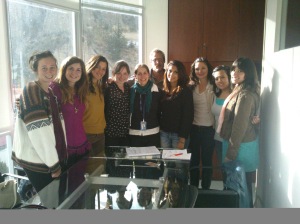
ChildFund team handing their Sexual Reproductive Health curriculum to Ana Vacas, ChildFund Youth Director
Thus, the curriculum is not intended as an academic curriculum but as a means of educating children, adolescents and youth about the body, relationships, sexual health and responsible decision-making. Initially, the curriculum is to be used in centres around La Paz and ultimately it is hoped that it will be branched out nationally. It is exciting to see how this curriculum will progress and how well it will be received here in Bolivia, where the topic of sex remains a sensitive one. However, it is still early days as we have just recently made the handover to Ana Vacas, the ChildFund youth director. Judging from her reaction though, things seem highly promising!
It hasn’t all been plain sailing here in La Paz; we’ve faced our fair share of obstacles. From irregular schedules and cancelled classes to Salmonella and E-coli; we’ve experienced it all. But we’ve pulled through and managed to keep our spirits high without losing sight of why we’re here. As we get ready to descend from the highest capital in the world, I can safely say that it has been an experience of a lifetime. Alongside working on our projects, we have been exposed to some of the world’s most beautiful landscapes and have shared some incredible experiences from touring Salar de Uyuni and the gorgeous lagunas, to joining the locals in the fiestas of Copacabana and La Paz’s Gran Poder. This experience has taught me a great deal about international development and has contributed to making me a more global citizen. Leaving Bolivia, I hope that our presence has had a positive influence on the communities here and that the ICS scheme continues to assist in development, working with Bolivians in making the most of the rich potential this unique country has to offer.
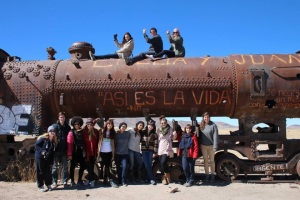
The volunteers exploring the unique train cemetery on the Salar de Uyuni tour
Written by: Dina Fahmy
Edited by: Liam Hilton
Proyecto Jardín
My name is Francesca and I am part of the Childfund team working at a centre called CESDI in the Chuquiaguillo area of La Paz. My main role in this centre has been assisting the educators running sessions for a group of adolescents (13-17 years old) and a group of children (6-12 years old). We run sessions that children attend before or after school on a variety of topics from leadership and sexual health to drama and arts and crafts. About a month or so in to working at the centre, I decided to create an individual project working on the garden at the centre. CESDI has a massive space but the walls are bare and the garden is massively overgrown yet it is in such a beautiful location that I felt compelled to inject some life and colour in to the outdoor space and make it an inviting place for children and young people to come. Another reason to do so has been to give the young people a task where they will be able to visibly see their accomplishment.
I set out a timeline of all the things I wanted us to do within the period I still had left at the centre. The timeline does not exclude the possibilities for the centre to continue with the work in the rest of the outdoor space as we are only focusing on one section during my time.
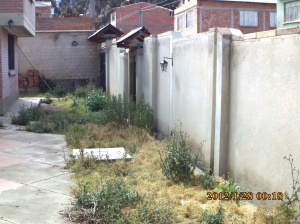
The garden, before de-weeding!
The first and most arduous stage was de-weeding the garden! With the help of my Cooperante Karina and some volunteers from other ICS project groups, we used spades and pick-axes to totally de-weed and remove the unwanted plants in the space we will be using. This took at least 3 days’ worth of work to achieve but the difference is incredible! Unfortunately, I was not as successful in recruiting the young people in the centre to come along and help in their own time. It is hardly surprising as it is manual labour and a lot of them have homework and other jobs to do however I cannot deny that I found this frustrating and disheartening as it was something I was organising for them. However, I really appreciated the help from the few that did come over those few days; I especially have noticed the hard work of one of the older boys who has not only come to every single session at the centre but came to every session to do manual labour and really worked hard. The fact that he cares so much and shows so much enthusiasm makes it more than worthwhile for me.
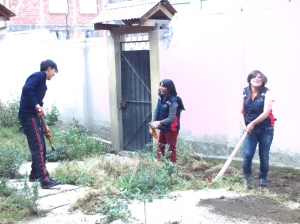
Local youth helping de-weed the garden
Our second stage was to plan the mural. I thought that this would be relatively easy as I wanted them to paint what they felt represented them and their community. When I brought the group together to get some ideas about what we could draw I found them surprisingly lacking in imagination! I tried to draw out ideas by asking them where they were from, what is typical of Bolivia, what they like to do etc. For a long time, they started at me with blank faces but once I started proposing answers such as “Cholitas”, “football” and “Illimani”; they began shouting their thoughts at me so we could create a big mind map. After this we drew a draft idea for the mural, incorporating everything they had said to get a clear idea about where they are from and who they are. I wanted them to show pride in themselves as individuals and also show ambition for what they could do in the future.
Our third stage is painting the mural! This stage is starting this week, unfortunately without me, but hopefully with the help of my fellow volunteers. The fourth and final stage will be planting in the area we have cleared in the garden. We have decided to grow plants that can be used for making tea such as camomile and anise; this gives the students the opportunity to look after and maintain the garden after I am gone and reap the reward when the flowers have grown by making tea!
Written by Francesca Sena
Edited by Liam Hilton
Breaking the Cycle
It’s easy for non-governmental organisations and international development agencies to focus on and highlight the dark side of a country to create empathy and promote an image of desperation. The key focus for a centre in Chuquiaguillo will be to combat violence faced by young people and to draw on their core values so they grow in to responsible, assertive and healthy adults.
As a voice for human rights, International Service works in collaboration with non-governmental organisations to support people and communities in La Paz to prosper, achieve their potential and to work together towards a more equal society. One of the organisations International Service is currently working with is Childfund, whose objectives are to promote human rights for children and adolescents by strengthening youth programmes for education and health. Under the International Citizen Service Scheme, a British volunteering programme, International Service and Childfund have placed British volunteers aged 18-25 years old in various children and youth centres around La Paz to strengthen the Childfund objectives.
The focus of this support is not on the victimisation of individuals or the failures of the wider society, but on the capability and determination of the community to bring about equality and install hope in the young people of La Paz.
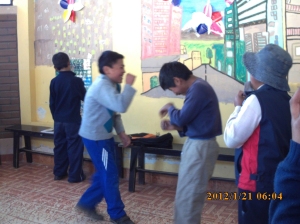
Bolivia is known for its rich cultural heritage, however 60% of Bolivia’s population lives under the poverty line and, in turn, 60% of children have their basic needs unmet. This poverty encourages a vicious cycle of violence and abuse with 75% of children suffering some form of physical, emotional or sexual abuse within the home which is attributed to the high level of alcohol consumption within communities[1]. This cycle is continuous, according to UNICEF, as boys are twice as likely to become abusive men themselves when they have been exposed to domestic violence, likewise girls are more likely to accept violence within their marriage when they witness acts of abuse against their mothers, therefore this violence transmits from generation to generation. Levels of schooling are also very relevant as young mothers tend to punish children at home more often however older mothers have a tendency to protect their children. The higher a mother’s level of education also means that she is less likely to punish her children physically or psychologically[2]. This is incredibly significant when you take in to consideration that the average school leaving age is 14 years old in Bolivia[3]. UNICEF have therefore indicated that possible solutions to end the cycle detailed above would be to foster or strengthen sexual and reproductive health policies, reinforce the culture of good treatment among children, adolescents, parents and teachers, and reinforce the policies that combat and prevent violence against women[4].
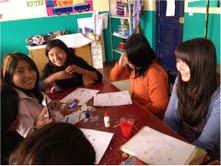
Ellie Stenson collaborating in creative work with local youth
Because of all these factors, the focus of our work at the centre in Chuquiaguillo is on values, leadership and sexual and reproductive health. As the children come together in classes, a discussion is held on what values we hold ourselves and what we respect in others and aspire to. They have recognised love, care, respect, solidarity, hope and peace among others as values they cherish in life. It is incredibly important that they not only concentrate on where they learned these values but also implementing them so that they become a part of their everyday interaction with people. They also recognised many defects or faults such as discrimination and violence and this first step of acknowledging right and wrong will help give them a consciousness of how they treat others and how they should expect to be treated. A drama class with some younger children also shed light on their views on violence. Using puppets, they acted out situations of violence on the street and at school. No matter how the argument or fight started, it ended in reconciliation and a comprehension that it is not the correct way of voicing opinions and showing emotions.
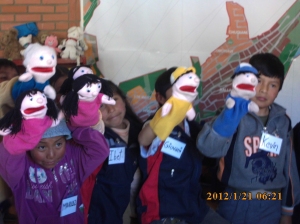
Children using puppets to explore taboo topics
Over the next few weeks there will be lessons, discussions and activities on leadership and sexual health. It’s important to keep these sessions interactive so as to inspire them to come every week but also to give them a level of communication that they may not receive at school. For this reason, the centre will be working together with the children, volunteers and educators, to renovate the garden into a more welcoming place with flowers and a mural of all the things that matter to the children to act as a constant reminder of their positive future.
These children of La Paz will be able to use the knowledge and skills taken from each session to understand their worth and value in society to enable them to prosper in whatever they do and achieve their full potential. The purpose of these workshops is, not only to become more self-aware but, to provide the students with the skills and competencies to be leaders of their own lives. They will also gain a crucial understanding of equality and be able to implement this in their current and future relationships. Moreover, the children will gain a greater understanding about health and, as they enter their teens and young adult life, have a better awareness of sexual health. Finally, they will be aware of violence and have the chance to grow into healthy young adults that break the cycle of abuse. The time is now to emphasise the importance of family and for each of us to break the cycle.
Written by Francesca Sena
Edited by Liam Hilton
[1] Childfund Website, http://www.childfund.org/bolivia/
[2] UNICEF – Bolivia. Determining factors in violence against children and adolescents, http://www.unicef.org/bolivia/resumen_determinantes_violencia_contra_NNA_bolivia_ENG.pdf
[3] CIA Bolivian fact book, https://www.cia.gov/library/publications/the-world-factbook/geos/bl.html
[4] UNICEF – Bolivia. Determining factors in violence against children and adolescents, http://www.unicef.org/bolivia/resumen_determinantes_violencia_contra_NNA_bolivia_ENG.pdf

